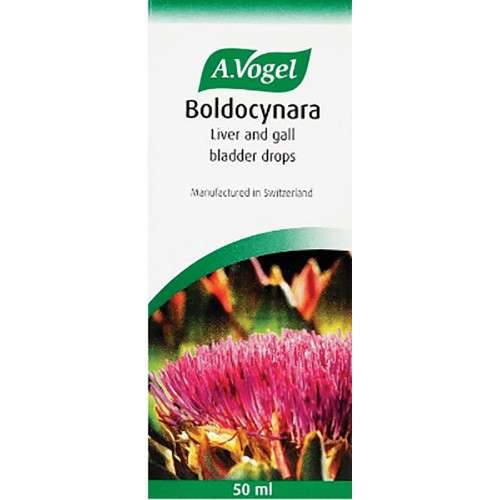
A Vogel Boldocynara 50ml
Check my rate
| Main centres: | 1-3 business days |
| Regional areas: | 3-4 business days |
| Remote areas: | 3-5 business days |

| Main centres: | 1-3 business days |
| Regional areas: | 3-4 business days |
| Remote areas: | 3-5 business days |
Boldocynara is used to:
Promote liver function by acting as a general liver tonic
Detoxify the liver
Treat symptoms caused by liver/gallbladder dysfunction including nausea, indigestion, sensation of fullness, flatulence, raised cholesterol and skin problems
Provide supportive treatment of the symptoms associated with overindulgence of food and drink
Support the production and flow of bile
Support digestion
Have an antispasmodic action in the digestive system
This was a tonic which Alfred Vogel counted on and recommended frequently to help support liver function.
To naturopathic doctors the body sometimes indicates sluggish or overloaded liver and kidneys long before pathological tests do.
Dosage
Adults and children over 12 years:
Take 10-15 drops with water, 3 times daily before meals.
Maintenance:
15 drops 1 to 2 times daily, in a little water.
Children:
This product is not recommended for children.
Ingredients
Cyanara scolymus (Globe artichoke): Liver cleanser, promotes flow of bile (cholanogogue), regulates cholesterol and is considered a liver protector, tonic and stimulant and relieves dyspepsia.
Taraxacum officinalis (Dandelion root and herb): Root stimulates bile flow and detoxifies the liver and its bitter components improve slow digestion and the leaf is a natural diuretic (used for loss of appetite, dyspepsia, flatulence and fullness sensation).
Peumus boldus (Boldo leaf): Improves bile flow, and as an antispasmodic relieves intestinal cramps, liver and digestion stimulant, anti-inflammatory and anti-ulcer effect.
Mentha piperita (Peppermint herb): Spasmolytic and carminative for the intestine, improves taste of the formulation too, good for dyspepsia and cramps.
Directions for use:
See dosage above.
On chronic medication:
People on regular chronic medication particularly may benefit from taking Boldocynara and Nephrosolid three times per day for six weeks, after which it should be taken once a day to assist the liver and kidneys process residue from the medication.
Precautions & contra-indications:
Do not exceed stated recommended daily dose. Do not take if pregnant or breastfeeding. Medical advice should be sought with acute and severe liver complaints such as hepatitis and bilary tract occlusion.
Boldocynara may not be taken by patients with obstructed bile ducts or liver cancer.
Not intended for people whose liver and/or kidney function have deteriorated seriously. Keep out of reach and sight of children.
Composition
Each mL (33 drops) contains the following tinctures:
Medicinal ingredients:
Fresh Artichoke leaf* (Cynara scolymus) (1:30) 0.467 mL equivalent to 14 mg leaf;
Fresh Dandelion root & herb (Taraxacum off.) (1:17) 0.12 mL equivalent to 6 mg root and herb;
Boldo leaf (Peumus boldus) (1:10) 0.07 mL equivalent to 6 mg leaf
Non-medicinal ingredients:
Fresh Peppermint herb* (Mentha piperita) tincture (1:2) 0.03 mL
1 mL of tincture contains 0.62 mL alcohol (ethanol)
* Certified organically grown by Bio Suisse
Actions & Pharmacology
Artichoke (Cynara scolymus):
The well-known effects of Artichoke on the liver are probably due to its phenolic acids (chlorogenic, caffeic and cynarine), sesquiterpenes, and flavonoids (scolymoside, cynaroside and luteolin). Artichoke extract relieves dyspepsia by stimulating bile production and excretion (choleretic and cholagogue effects). Artichoke is also effective against hypercholesterolemia.(1) Thanks to the antioxidant effects of the flavonoids, Artichoke, a bit like Milk Thistle, has very interesting hepatoprotective properties.(2) This effect was demonstrated against an industrial solvent, carbon tetrachloride.(3) Traditionally, Artichoke is used as an aperitive, a depurative and a diuretic.
The German Commission E acknowledges its benefits in cases of: dyspeptic problems.
Dandelion (Taraxacum officinalis):
Dandelion is a very interesting herb for the digestive system. Its root has cholagogue and depurative properties for the liver. The bitter constituents, collectively called taraxacins (sometimes eudesmanolides), have a beneficial effect on slow digestion. Dandelion leaf is one of the best herbal diuretics. It is also a very good source of carotenes and potassium. The whole herb is used for loss of appetite, dyspepsia, flatulence and feelings of fullness after meals.
The German Commission E acknowledges its benefits in cases of: disturbances in bile flow, edema, loss of appetite, and dyspepsia.
Boldo (Peumus boldus):
Boldo is a South American herb used to relieve intestinal cramps, bile flow problems and cystitis. Boldo has diuretic, sedative (antispasmodic), bile stimulating and antiseptic effects. Its main constituents are alkaloids (responsible for the digestive and liver stimulation) and a volatile oil (responsible for the antiseptic effect).
The German Commission E acknowledges its benefits in cases of: mild spastic complaints of the gastrointestinal tract and dyspepsia.
Peppermint (Mentha piperita):
In addition to its good taste, peppermint acts as a spasmolytic and carminative (anti-flatulent) and stimulates the liver functions. It is rich in azulene, a substance known for its anti-inflammatory and anti-ulcer effects. Its other components are flavonoids and a volatile oil rich in menthol. Peppermint is often used to relieve dyspepsia and digestive cramps.
Peppermint is "generally recognized as safe" (GRAS) in the USA, which means that it is safe at amounts found in food.
The German Commission E acknowledges its benefits in cases of: flatulence; spastic complaints of the gastrointestinal tract, the gallbladder and bile ducts.